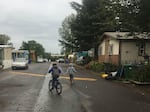On a recent weekend, community organizer Myra Torres knocked on doors at the Arbor Mobile Home Park in northeast Portland. Her kids, 5-year-old Adriel and 3-year-old Sammy, tagged along.
The Arbor, where Torres lives, has narrow streets lined with about 130 manufactured homes. Next to the homes sit tomato plants, rose bushes and neat stacks of firewood.
Torres was giving her neighbors fliers explaining a proposal to change Portland’s land use regulations and give manufactured home parks their own special zone. The proposal hit the Portland City Council this week, and made mobile home parks the latest front in the struggle over displacement and rising housing prices.

Adriel and Sammy Torres on their block in the Arbor manufactured home park.
Amelia Templeton / OPB
“I care because this is my stability for my children," Torres said. "We’ve been in this Cully neighborhood for about 13 years, so this is community. This is home."
Torres, 25, works at a nearby church and owns her trailer. She spends about $500 a month renting the lot beneath the trailer, which has two bedrooms and two bathrooms. That's about half what nearby apartments cost monthly.
When Torres first moved to the Arbor, she thought she and her husband would live in the park until they saved enough for a down payment and buy a conventional home.
“But the way the prices of the homes have been going crazy up, and all the apartments as well, it becomes more of a permanent thing to do, rather than for just a couple of years,” she said.
Living in a manufactured home park comes with unique opportunities — and costs. Residents often own their trailers or homes and rent the land the units sit on.

A garden in the Arbor manufactured home park.
Amelia Templeton / OPB
Like other homeowners, they can invest in their properties, repaint and keep pets. At the Arbor, residents have built garages, trellises and sheds. In one backyard, a duck and a small dog keep each other company.
But manufactured homes, particularly the older models, tend to depreciate. And many of the homes in Portland’s parks are too fragile to move, making the residents' investments risky.
Laura Perasa, one of Torres’s neighbors, estimates she’s spent $5,000 fixing up her trailer.
“If this place was closed down, there’s no way we could move this house. It’s old, we’ve added on an addition,” she said. “We would lose that investment.”
The managers of the Arbor say its owners have no plans to close the park, in fact, they’re urging residents to sign longer leases. But with new apartments going up all over Cully, the park’s residents worry their home could be the next attractive target for developers.
The city’s manufactured home parks comprise about 3,000 households. That's a relatively small number, but it includes many low-income Latino families, such as the Torreses, and seniors and people with disabilities and on fixed incomes.
Related: Building Affordable Housing In Portland Not So Affordable
Those are the people Portland is struggling to figure out how to keep from getting pushed out of the city or into homelessness.
In June, Portland's planning commission recommended creating a new zoning classification specifically for manufactured home parks.
The city's manufactured home parks all lie east of the Willamette River and are clustered in East Portland. Some are on land zoned for residences, while others are non-conforming uses of land zoned for business uses.
Under the proposal, all but one of the city’s existing parks would get rezoned and included in the new Manufactured Dwelling Park Zone.
In effect, that would make it harder to redevelop parks. It would require an expensive review process, a Comprehensive Plan map amendment and a City Council vote any time a developer proposed closing a mobile home park and building something else on the land.
Park owners oppose the proposal.
"Any time you have restriction, it reduces the interest in investment,” said Cory Poole, a board member of the Manufactured Housing Coalition of Oregon.
Poole points out that many of the city’s mobile home parks were built in the 1960s. Some have crumbling roads and failing sewer systems.
“I know first hand as a park owner that one sewer problem can cost you hundreds of thousands of dollars to fix,” Poole said.
Poole said that it’s rare for parks in Portland to close and get redeveloped as something else, in part because of existing state laws that protect park residents.
Portland has lost 44 mobile home spaces to park closures in the past two years. When parks do close, Poole says it’s often because a manufactured home park, or the homes in it, just weren’t built to last 50 years.

Laura Perasa says moving her manufactured home would be impossible.
Amelia Templeton / OPB
In 2017, the city's Bureau of Planning and Sustainability commissioned a study that looked at the potential impact of an earlier version of the proposal to create special zoning for manufactured home parks.
That study, conducted by Johnson Economics, concluded that redevelopment of manufactured housing parks to rental apartments “is unlikely in the current construction cycle.”
In fact, based on that study, the greatest displacement threat the city’s mobile home park residents face might not be from redevelopment — but from rising space rents.
Johnson Economics looked at a sample of 11 parks. Rents ranged from $305 to $665 a month. The firm concluded that the rent for mobile home park spaces is likely to grow faster than apartment rents in the coming years.
The Planning Commission has urged the Portland City Council to take steps in addition to the zone change to help stabilize the rents in manufactured housing parks.
In particular, commission members proposed giving park owners a property tax cut if they agree to maintain rents that are affordable for low-income households.
Critics of the zoning proposal also question whether parks are the best long-term land use in a growing city such as Portland.
Related: Metro Council Sends $652 Million Housing Bond To Voters In Portland Region
The city’s new zone for mobile home parks includes a density limit, 29 homes per acre. That’s more units than many parks are allowed under their current zoning, but Cory Poole thinks it’s still not enough.
Like many local economists, Poole believes the key to keeping housing affordable in Portland is allowing more density, more units and more big apartment complexes.
Poole thinks manufactured home parks could be perfect place to experiment with new types of more dense housing.
“What could these parks look like in 150 years if the city made it easier, say to put tiny homes in these parks? If the city made it possible to put multistory shipping container homes in these parks?” he said. “The more restrictions the city puts on it, the more it is going to squelch the really creative ideas that could solve these problems.”
Portland’s planning commission wrestled with this density question during its discussion about mobile home parks. Is it worth preserving a home park, for example, if building an apartment complex on the same land could house hundreds more people?
The zoning proposal includes a bonus, which allows for 50 percent more units on a site for parks that rent out at least half of their spaces at a price affordable for people who make 60 percent or less of the median income in Portland
In the end, the planning commission decided that parks were worth preserving, not because of the number of housing units they offer but because of the strong communities that exist in many of the developments.
Back at the Arbor, Myrra Torres says it’s that community that makes her home worth fighting for.
Her parents and in-laws live in the park, too, and she says there are always friends or family around to keep an eye on her kids.
“There’s times, if I’m not home in time to make it in time, when my son is coming home, I know I can call my mom and say, 'Watch out for the kids, they’re coming,'” she said.
Editor's note: This article has been updated to reflect the number of households, not people, that comprise the city's manufactured home parks.

